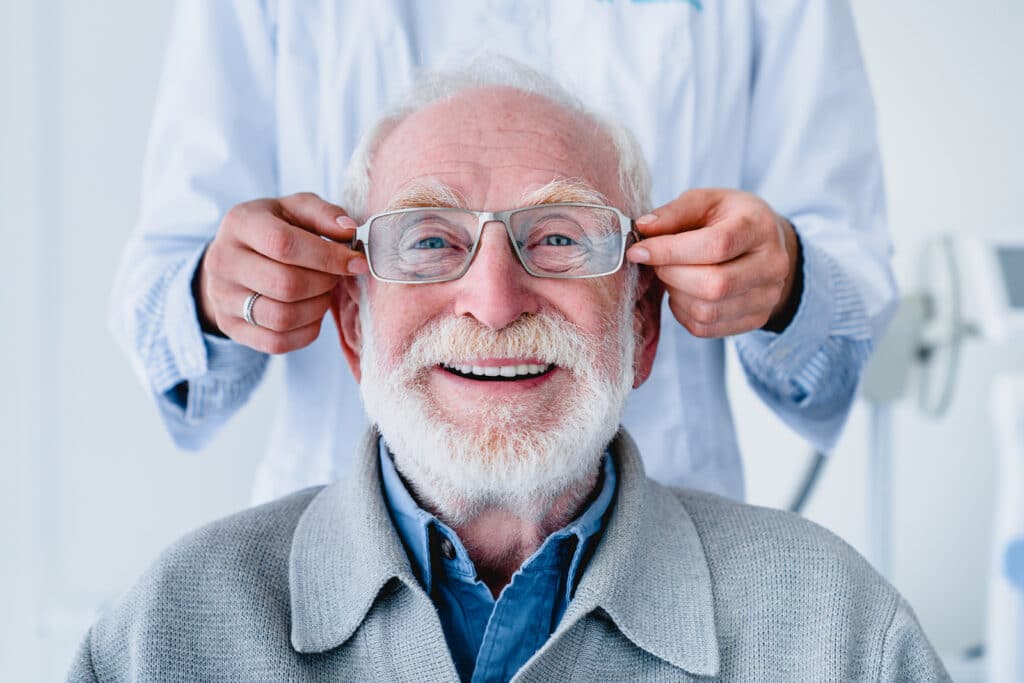Health and wellness are a top priority as you age, though some areas of your overall health may need more attention than others. Understanding the importance of your eye health and protecting your vision is a crucial part of the aging process. When hearing about the importance of doing simple things such as going to an annual eye exam, understanding the weight of those exams, and what can come from them will help ensure your eyes are healthy and manageable. Here are some reasons why seniors should receive annual eye exams to support their eye health.
Eye disease comes with age
While having conditions like nearsightedness or farsightedness can come in your youth, there are also certain eye conditions that come with age. Though some are curable, others are only treatable, so it is important to know the signs and symptoms of many common eye diseases to ensure detection early on. Here are some of the conditions:
- Age-Related Macular Degeneration- This eye disease is also known as AMD and it affects the central vision of the eye. Some common symptoms of AMD are blurry or fuzzy vision, straight lines appearing wavy, and dark spots appearing in your central vision. Because there are different stages of AMD, early, intermediate, and late, identifying symptoms in the early stage can be tricky, and most symptoms are identifiable in the intermediate and late stages. There is no cure for AMD, but treatments are available to slow the progression of symptoms. While AMD has environmental factors that cause it, there are genetic factors at play as well. Knowing your family’s health history can allow you to make lifestyle changes to prioritize your eye health.
- Diabetic Eye Disease- This is a group of diseases that can be a result of diabetes in older adults. From diabetic retinopathy to macular edema, these diseases can cause vision loss and discomfort. Some common symptoms are vision distortion, impaired color vision, and abnormal blood vessels in the eye. Management of diabetes can help reduce symptoms of diabetic eye disease. Many eye doctors will recommend more frequent visits to them to monitor any changes to your vision.
- Glaucoma- When left untreated, this eye disease is one of the leading causes of blindness in adults over 60. Glaucoma affects the optic nerve, which is vital to vision health. A build-up of pressure in the eye damages the optic nerve, thus beginning the process of vision loss. With over 200,000 cases in the U.S. each year, this is a very common, but serious eye condition. Much like AMD, this is treatable, not curable. From eye drops to medications, and even surgery, the treatments for glaucoma will help alleviate the pressure build-up in the eye.
- Cataracts- This eye disease is when the lens of your eye develops cloudiness. This cloudiness results in blurred vision making it difficult to complete many normal tasks such as reading and driving. When left untreated, cataracts can lead to total blindness. This is a relatively common eye disease, especially in older adults. Surgery is possible and involves removing the lens with cataracts from the eye and replacing it with an artificial one. Eye doctors will suggest surgery when cataracts diminish your quality of life, and up until that point, they will prescribe prescription glasses to mitigate the vision issues.
How often should seniors go to the eye doctor?
Experts recommend that seniors visit their eye doctor every 1-2 years. Because many of these eye diseases listed above have symptoms that include eye discomfort and blurry vision, it’s also important to make an appointment with your ophthalmologist at the earliest sign of any of any vision problems. These changes to vision could be as simple as needing a new prescription for glasses or be indicative of needing more testing to confirm a diagnosis.
Seniors that need prescription eyewear should maintain an annual cadence with their eye doctor to ensure their prescription is as current as possible. Updating your eyeglasses when there is an adjustment to the prescription allows you to notice any changes to eyesight early on.
Changes to your eyesight, whether big or small, can affect many aspects of your life. Your doctor will help you create a routine that will promote the health of your eyes. Knowing how to make healthy changes to your lifestyle and how they can impact your sight will help keep you feeling self-sufficient. Some ways to put your eye health first are:
- Create an eye-healthy diet- As you age, your dietary needs change. Improving your diet and including foods that support vision health is a great step to putting your eyes first. Including vegetables that promote eye health like carrots, leafy greens, and foods rich in omega-3 fatty acids can help delay the onset of vision loss.
- Understand your family health history- Your family health history is a great tool to use when developing healthy habits for the sake of your wellness and well-being. Utilizing a DNA testing service can help you determine if there is a history of eye disease in your family line. From there, you can create a regime with your eye doctor to combat the onset. Determining a diet, adding some eye supplements to your daily routine, and even doing some eye exercises along with your regular fitness routine can all aid in the health of your eyes.
Being informed and creating a lifestyle to support healthy eyes will ensure the protection of one of your greatest assets. Your eyesight plays a huge role in your quality of life, so taking the proper precautions will guarantee comfort, protection, and happiness.
For more information on senior living communities and the benefits they offer older adults, download our Senior Living Options guide today! Or contact us today to schedule a tour.




